Unit-4-I-have-a-pen-pal-PB-Let's-talk课件
新版PEP六年级上册unit4-I-have-a-pen-pal教案

Unit Four I Have a Pen Pal第一课时Unit 4 A Let’s talk教学设计(A Let’s try Let’s talk)一、教学目标(一)认知目标1. 能够听、说、读、写句型What are Peter’s hobbies? He likes reading stories.并能在实际情景中灵活运用。
2. 能独立完成Let’s try部分的练习。
3. 能够唱歌曲My new pen pal.(二)能力目标培养学生的听力技巧及口头表达能力。
(三)情感目标教育学生积极运用所学语言进行表达与交流。
二、教学重难点(一)重点掌握句型What are Peter’s hobbies? He likes reading stories.突破方法:朗读课文,进行替换练习,突破重点。
(二)难点在实际情景中正确运用句型He/She likes ...突破方法:熟练朗读课文,进行情景对话,突破难点。
三、教法与学法引导法,点拨法。
四、教学准备教师准备多媒体课件、课文情景动画或音频MP3,另外有海报,照片等。
五、教学过程Step 1: Warm-up1. 教师出示动词短语图片,要求学生根据图片内容做动作并说出该短语,然后听写这些短语,可请几名学生在黑板上示范书写。
如:visit my grandparents,see a film,take a trip,go the supermarket ...2. 教师播放歌曲My new pen pal,学生先静听感受旋律,教师适当解释学生不理解的如pen pal。
然后师生跟着音乐学唱,最后一起合唱。
Step 2: PresentationLet’s try教师引导学生看问题,并标记出问题中的关键词。
然后播放Let’s try 问题听录音,回答问题:①( ) Peter likes basketball.②( ) Peter isn’t tall.教师核对答案,再次播放录音,让学生从录音中找出回答问题的关键语句,尽量让学生听出原文录音。
Unit-4-I-have-a-pen-pal-B-Let's-talk

Does she/he like/live/go….?
肯定回答:Yes,she/he does.
否定回答: No,she/he doesn’t. (dosen’t=does not)
Yes, he does.Does he like playing the
violin?
Does he like making kites?
Yes, he does. He studies Chinese.
Does he study Chinese?
This is my new pen pal. He lives in Australia. I have a new pen pal
in Australia.
What are you doing?
city.
goes hiking
Does he go hiking?
Yes, he does. He goes hiking.
cooks Chinese food
Does she cook Chinese food?
Yes, she does.
She cooks Chinese
food.
does word puzzles
No, he doesn’t.
Does he like swimming?
No,he doesn’t.
He likes playing basketball.
Does he like playing football.
No,he doesn’t.
He likes running.
Does she like diving?
Amazing!
Does he/ she like doing word puzzles/ going
【同步教学设计】Unit 4 I have a pen pal PB Let's talk (公开课
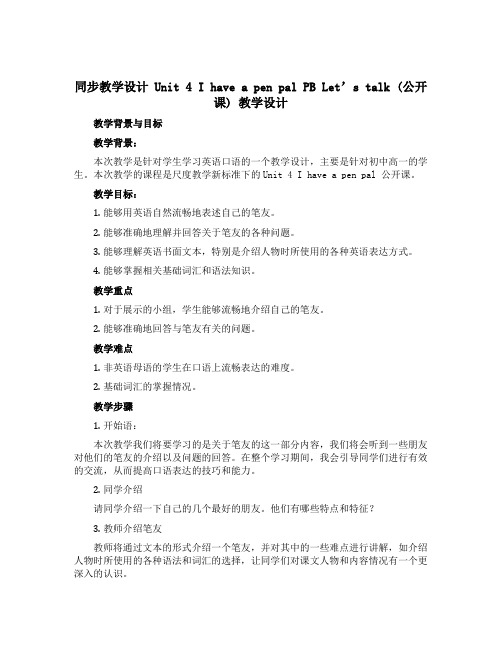
同步教学设计Unit 4 I have a pen pal PB Let’s talk (公开课) 教学设计教学背景与目标教学背景:本次教学是针对学生学习英语口语的一个教学设计,主要是针对初中高一的学生。
本次教学的课程是尺度教学新标准下的Unit 4 I have a pen pal 公开课。
教学目标:1.能够用英语自然流畅地表述自己的笔友。
2.能够准确地理解并回答关于笔友的各种问题。
3.能够理解英语书面文本,特别是介绍人物时所使用的各种英语表达方式。
4.能够掌握相关基础词汇和语法知识。
教学重点1.对于展示的小组,学生能够流畅地介绍自己的笔友。
2.能够准确地回答与笔友有关的问题。
教学难点1.非英语母语的学生在口语上流畅表达的难度。
2.基础词汇的掌握情况。
教学步骤1.开始语:本次教学我们将要学习的是关于笔友的这一部分内容,我们将会听到一些朋友对他们的笔友的介绍以及问题的回答。
在整个学习期间,我会引导同学们进行有效的交流,从而提高口语表达的技巧和能力。
2.同学介绍请同学介绍一下自己的几个最好的朋友。
他们有哪些特点和特征?3.教师介绍笔友教师将通过文本的形式介绍一个笔友,并对其中的一些难点进行讲解,如介绍人物时所使用的各种语法和词汇的选择,让同学们对课文人物和内容情况有一个更深入的认识。
4.听录音并回答问题请同学们听录音,回答所听到的关于笔友的问题,使同学们更好地理解笔友的情况。
5.小组展示请同学们按照小组进行分组,分别用自己的表达方式介绍自己的笔友,并回答有关问题。
6.互动和评估在小组展示结束后,教师将与学生进行互动交流,并进行相应的评估,以提高同学们的口语表达技巧和运用能力。
教学评价通过本次教学设计,同学们可以对笔友的各种介绍方式有一个更深入的认识。
同学们可以在教学过程中加深记忆和知识积累,并通过交流,增加相互之间的了解和掌握实际口语的能力。
同时,在其中进行的评估和反思,能够为教师和同学们提供改进和优化的方案。
六年级英语上册Unit-4-I-have-a-pen-pal-Part-B-Let's-talk教学设计
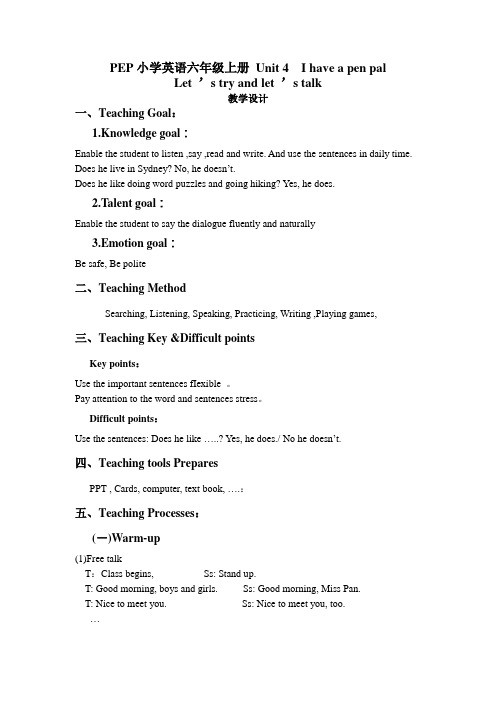
PEP小学英语六年级上册Unit 4 I have a pen palLet ’s try and let ’s talk教学设计一、Teaching Goal:1.Knowledge goal:Enable the student to listen ,say ,read and write. And use the sentences in daily time. Does he live in Sydney? No, he doesn’t.Does he like doing word puzzles and going hiking? Yes, he does.2.Talent goal:Enable the student to say the dialogue fluently and naturally3.Emotion goal:Be safe, Be polite二、Teaching MethodSearching, Listening, Speaking, Practicing, Writing ,Playing games,三、Teaching Key &Difficult pointsKey points:Use the important sentences fIexible 。
Pay attention to the word and sentences stress。
Difficult points:Use the sentences: Does he like …..? Yes, he does./ No he doesn’t.四、Teaching tools PreparesPPT , Cards, computer, text book, ….:五、Teaching Processes:(一)Warm-up(1)Free talkT:Class begins, Ss: Stand up.T: Good morning, boys and girls. Ss: Good morning, Miss Pan.T: Nice to meet you. Ss: Nice to meet you, too.…(二) ReviewShow the picture, singing, dancing, reading stories, playing football, doing kung fu. Game: I say, You do.(三)Presentation& Consolidation1、Let’s tryLead the students to listen to the tape carefully and complete the questions.2、Let’s talk(1) Listen the dialogue carefully, and answer two questions.①What’s Wu Yifan’s pen pal’s name?②Where does he live?(2)①Can you follow me?②③④⑤⑥(四) SummaryAct the dialogue, and change the dialogue use the oral English.(五)HomeworkWrite an email to Vicky in English.(六)Blackboard DesignUnit 4 I have a pen palDoes he live…..?No, he doesn’t.Does he like…..?Yes ,he does.。
pep人教版小学六年级上册小学英语《Unit 4 I have a pen pal B Let’s talk》教学设计

pep人教版小学六年级上册小学英语Unit 4 I have a pen pal BLet’s talk教材:《小学英语(pep人教版)》六年级上册P40课型:对话教学时间:40分钟一、教学内容分析本节课选自由人民教育出版社课程研究所、英语课程教材研究开发中心、加拿大灵通教育有限公司联合编写,人民教育出版社出版的《小学英语(pep 人教版)》六年级上册第四单元I have a pen pal B部分的let’s talk. 对话的大意是:吴一凡在给笔友写邮件,约翰向吴一凡询问了一些关于他笔友的信息,然后发现吴一凡的笔友也叫约翰,而且和约翰有这同样的爱好,因此约翰也想和吴一凡的笔友成为笔友。
对话的内容如下:John: Hey, Yifan. What are you doing?Wu Yifan: I’m writing an email to my new pen pal in Australia.John: Does he live in Sydney?Wu Yifan: No, he doesn’t. He lives in Canberra. His name is John, too.John: Really? Does he like doing word puzzles and going hiking?Wu Yifan: Yes, he does.John: Amazing! I like those too! Can I also be his pen pal?Wu Yifan: Sure. Why not?John: Cool!学生已经学过如果询问关于人物姓名、爱好、家庭成员、经常做的事情等,但是对话当中出现的Does开头的一般疑问句还没学过,因此本节课,帮助学生复习人物的相关问题,并学会使用Does来询问关于笔友的信息是本课的重点难点。
二、学情分析六年级的学生已经学习英语几年了,具备基本的对话能力,询问人物信息的能力,而且六年级的学生活泼好动,爱表现。
人教版(PEP)六年级上册Unit4IHaveaPenPalPBLet'stalk课件
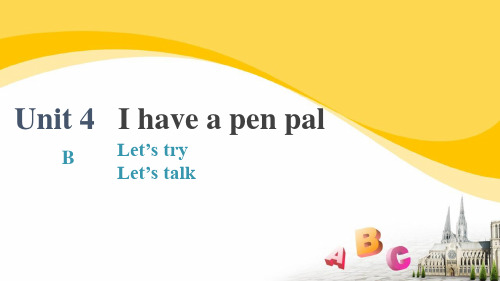
John.
Presentation
Listen and answer
What are John’s hobbies?
Wu Yi Fan’s new pen pal lives in _______.
Sydney a fdamoouws coitgyrdo hpikueing s
Canberra capital
Practice
Talk about your hobbies.
Let’s act
Production
Lives in: New York Age:10 Hobbies:
doing word puzzles singing Habit: often reads Name: Cindy
Lives in: London Age:15 Hobbies:
Presentation
Read and complete
Name: John
Live in: Canberra
Come from:
Australia Hobbies: do word puzzles and go hiking
Presentation
句式Y结e构s, :he does. / No, he doesn’t.
Does he …?
Does he / she + 动词原形?
肯定回答: Yes, he / she + does.
否定回答:No, he / she + doesn’t.
Practice
Read in groups
Sharp eyes
Practice
Does he live in Sydney?
A. He is 11 years old. B. He is 12 years old.
Unit 4 I have a pen pal B Let’s talk(教案)人教PEP版英语六年

Unit 4 I have a pen pal B Let’s talk(教案)教学目标1.学生能够表达自己期望的笔友特点;2.学生能够就自己期望的笔友特点进行讨论;3.学生能够使用简单的英语表达自己的意见和建议。
教学重点1.学生能够用英语表达自己期望的笔友特点;2.学生能够简单阐述自己的看法和建议。
教学难点学生能够用适当的词汇和表达方式描述自己期望的笔友特点。
教学准备1.PPT;2.小黑板、粉笔;3.笔和纸。
教学过程Step 1 Revision1.复习上节课所学内容,通过回忆进行提问:What did we learn last lesson?(我们上节课学了什么?)2.学生齐声复习上节课所学单词和句子。
Step 2 Presentation1.展示关于笔友的图片,通过让学生描述图片介绍笔友的概念;2.分组讨论,让学生根据图片介绍笔友的特点。
Step 3 Practice1.将学生分成小组,讨论各自期望的笔友特点;2.让每个小组派代表向全班介绍其团队期望笔友的特点,其余小组可以发表一些类似的看法和意见。
Step 4 Production1.在黑板上写出以下提示性语句:I hope my pen pal is … I want my pen pal to be … My pen pal should be … My ideal pen pal is …2.让学生用上述语句进行口语练习;3.让部分学生向全班演讲自己期望的笔友特点。
Step 5 Summary1.总结本课程所学笔友相关的重点词汇和表达方式;2.教师总结全班的看法和意见。
Step 6 Homework1.让学生写一篇关于自己期望的笔友的文章,文章要求:80词以上,不少于5个句子;2.鼓励学生用上本节课学过的句型和词汇。
教学反思本节课通过图片让学生更深入地了解笔友,并让学生自己讨论和发表自己的看法和意见,增强了学生的口语表达能力。
另外,在教学过程中加入了写作环节,让学生巩固所学内容。
unit 4 I have a pen pal B let's talk教案

Unit 4 I have a pen palLet’s talk教学目标知识能力目标1.能听,说,读单词及短语Sydney, Canberra, doing word puzzles,goinghiking.2.能够听、说、读、写句子Does he live in Sydney? No, he doesn’t. Does helike doing word puzzles and going hiking? Yes, he does. 并能在实际情景中正确运用。
3.能用所学举行来询问他人的一些日常生活情况。
情感目标教育学生善交朋友重点、难点重点:灵活运用本节课的重点句型。
朗读时做到语调自然,语音准确。
难点:在实际情景中正确运用所学对话。
教学过程:Step 1: Warm up1.Greeting2.Let’s chantWhat are your hobbies? What are your hobbies?Singing, singing. I like singing .What are her hobbies? What are her hobbies?Dancing, dancing. She likes dancing.Doing, doing. She likes doing kung fu.What are his hobbies? What are his hobbies?Playing, playing. He likes playing football.Reading, reading. He likes reading stories.Step2: Presentation1.教师介绍笔友,出示笔友图片This is my pen pal. She is Li Jie. She lives in Beijing. I live in Shicheng. She likes singing and dancing. I like those too. We often write e-mails.引出:Does she live in Shicheng/Beijing? 帮助学生回答:Yes, she does./No, she doesn’t.2.通过Guessing game 猜他人的住址来练习句型Does she live in Nanchang?Does he live in Shanghai?3.教师出示简单字谜游戏,教学生玩,学生完成后说:These are wordpuzzles. 教读单词word puzzles。
六年级上册英语说课稿《Unit4Ihaveapenpal-4BLet'stalk》人教(PEP)

六年级上册英语说课稿《Unit4 I have a pen pal-4 B Let’s talk》人教(PEP)一. 教材分析《Unit4 I have a pen pal-4 B Let’s talk》是人教版PEP小学英语六年级上册的一篇对话课文。
本节课的主要内容是学习关于介绍笔友的信息,并通过对话交流来提高学生的英语口语表达能力。
本节课的主要语言点是介绍自己的笔友,以及询问和回答关于笔友的个人信息。
教材通过两个简单的对话,让学生学会如何用英语介绍自己的笔友,并能够询问和回答关于笔友的问题。
二. 学情分析六年级的学生已经具备了一定的英语基础,能够听懂并能够运用简单的英语进行日常交流。
但是,学生在口语表达方面还存在一定的问题,需要通过大量的练习来提高。
此外,学生对于介绍自己的笔友这一主题可能比较陌生,需要通过教师的引导来进行学习和交流。
三. 说教学目标1.知识目标:学生能够听懂、说出一系列与笔友相关的词汇,如:penpal, letter, hobby等。
学生能够正确使用一般现在时态介绍自己的笔友,并能够询问和回答关于笔友的问题。
2.能力目标:学生能够通过听力理解,获取对话中的关键信息,并能够运用所学的语言知识进行口语表达。
3.情感目标:通过学习,学生能够体会到与笔友交流的乐趣,提高学习英语的兴趣。
四. 说教学重难点1.重点:学生能够听懂、说出一系列与笔友相关的词汇,并能够正确使用一般现在时态介绍自己的笔友,询问和回答关于笔友的问题。
2.难点:学生能够运用所学的语言知识进行口语表达,尤其是在询问和回答关于笔友的问题时,能够灵活运用所学知识。
五. 说教学方法与手段本节课采用情境教学法、交际法和生活化教学法进行教学。
在教学过程中,教师会创设一个关于笔友的情境,让学生在真实的语境中进行听力理解和口语表达。
同时,教师会通过提问、引导等方式,激发学生的思考和参与,提高学生的口语表达能力。
六. 说教学过程1.热身(5分钟):教师通过与学生进行简单的英语交流,引导学生进入英语学习的状态。
人教PEP六年级上册英语《Unit 4 I have a pen pal PB Let’s talk
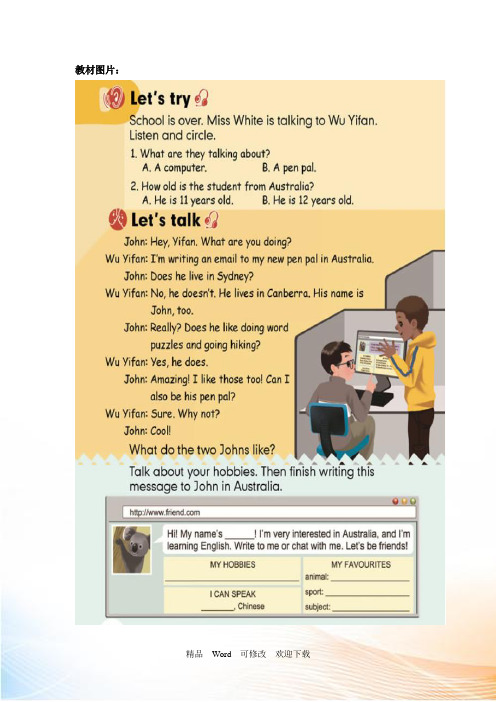
教材图片:Unit 4 I have a pen pal PB Let’s talk教案教材:人教PEP小学英语六年级上册P40单元主题:I have a pen pal课型:听说课一、教学目标1. 能够听、说、朗读与爱好有关的英文表达,如Does he like doing word puzzles and going hiking? Yes, he does.2. 能够正确听、说、认读单词amazing, Canberra等。
3. 运用一般现在时的一般疑问句句型Does he/she …?来进行提问。
二、学情分析学生已掌握部分有关爱好的单词短语,并能在实际生活中初步表达自己的爱好,能简单询问他人的爱好。
但是对于一般疑问句的表达还不够了解,这也正是本课的教学重难点。
三、重难点能够运用一般现在时的一般疑问句句型,来提问他人的住处、爱好等情况并能作答,学生能够在真实的语境中灵活运用本课重点句型,并能根据课文大胆创编对话。
四、教学过程Step1【导入】Warm up/Review1. Guessing game.Do you like playing g uessing game? Let’s play and guess.2. Talk about hobbiesDo you know more about hobbies?Step 2【讲授】Presentation1. Meet the new words: word puzzleDo you like this game? We call it “word puzzle”.Do you like doing word puzzles?2. Let’s tryI also like listening to English. School is over, Miss White is talking to Wu Yifan.(1) P40: Listen and circle.Yes, they’re talking about the pen pal. What is pen pal? Who has a pen pal?(2) Fill in the blanksWu Yifan would like a pen pal from Australia. He’s a Primary student. He’s 11 years old. He wants to write an email to him.3. Let’s talkNow. Wu Yifan is writing the email. And he is talking to John.(1) 介绍Canberra(2) Listen and answerWhat’s Wu Yifan’s pen pal’s name?Does he like going hiking(远足)?(3) Compare two JohnsHave the students guess:Where does he live?What are his hobbies?Teach: amazing(3) Watch the cartoon(4) To sum: Wu Yifan is writing an email to his _______. His name is ______. He lives in ________. He likes ________________ and _______________. John likes them, too. It’s ________. So John also wants to be his pen pal.(5) Reading timeA. Read it better. Listen the dialogue and make some intonation.B. Act it out.Step3【活动】Extension1. Meet the teacher’s pen pal.Have the students guess:Wh at’s her name?How old is she?Does she live in …?Does she like …?2. Meet the new pen pal.Do you want to make a new pen pal too?Here I recommend a website for you to make a pen pal.When you log in, you will find many pen pals are waiting for you, they come from different countries, they have different hobbies, and they’re in different ages.So I choose two of them to recommend for you.Work in pairs to finish the information.3. Talk about who you would like to be your pen pal. Why?Step4 Homework1. 跟读P40对话,仔细模仿语音语调。
Unit 4 I have a pen pal Part A Let’s talk教案
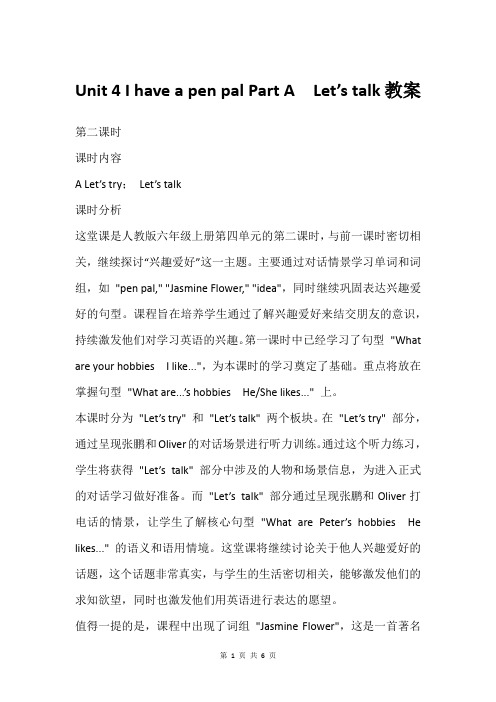
Unit 4 I have a pen pal Part A Let’s talk教案第二课时课时内容A Let’s try;Let’s talk课时分析这堂课是人教版六年级上册第四单元的第二课时,与前一课时密切相关,继续探讨“兴趣爱好”这一主题。
主要通过对话情景学习单词和词组,如"pen pal," "Jasmine Flower," "idea",同时继续巩固表达兴趣爱好的句型。
课程旨在培养学生通过了解兴趣爱好来结交朋友的意识,持续激发他们对学习英语的兴趣。
第一课时中已经学习了句型"What are your hobbies I like...",为本课时的学习奠定了基础。
重点将放在掌握句型"What are...’s hobbies He/She likes..." 上。
本课时分为"Let’s try" 和"Let’s talk" 两个板块。
在"Let’s try" 部分,通过呈现张鹏和Oliver的对话场景进行听力训练。
通过这个听力练习,学生将获得"Let’s talk" 部分中涉及的人物和场景信息,为进入正式的对话学习做好准备。
而"Let’s talk" 部分通过呈现张鹏和Oliver打电话的情景,让学生了解核心句型"What are Peter’s hobbies He likes..." 的语义和语用情境。
这堂课将继续讨论关于他人兴趣爱好的话题,这个话题非常真实,与学生的生活密切相关,能够激发他们的求知欲望,同时也激发他们用英语进行表达的愿望。
值得一提的是,课程中出现了词组"Jasmine Flower",这是一首著名的中国民歌。
在教学中,可以播放这首歌曲,让学生欣赏并感受其中的文化元素。
【同步教案】Unit 4 I have a pen pal PB Let's talk (公开课)
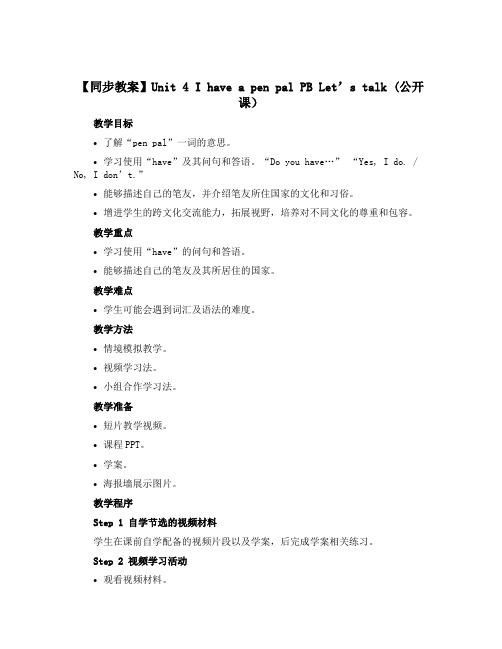
【同步教案】Unit 4 I have a pen pal PB Let’s talk (公开课)教学目标•了解“pen pal”一词的意思。
•学习使用“have”及其问句和答语。
“Do you have…” “Yes, I do. / No, I don’t.”•能够描述自己的笔友,并介绍笔友所住国家的文化和习俗。
•增进学生的跨文化交流能力,拓展视野,培养对不同文化的尊重和包容。
教学重点•学习使用“have”的问句和答语。
•能够描述自己的笔友及其所居住的国家。
教学难点•学生可能会遇到词汇及语法的难度。
教学方法•情境模拟教学。
•视频学习法。
•小组合作学习法。
教学准备•短片教学视频。
•课程PPT。
•学案。
•海报墙展示图片。
教学程序Step 1 自学节选的视频材料学生在课前自学配备的视频片段以及学案,后完成学案相关练习。
Step 2 视频学习活动•观看视频材料。
•与小组成员商讨并记录视频中出现的信息。
•掌握有关“pen pal”的基本概念。
Step 3 学生合作交流•小组成员互相介绍自己的笔友。
•交流整个小组有哪些笔友生活在不同的国家。
•讨论不同国家的文化和习俗。
Step 4 教师讲授•老师针对视频碎片展开教学,详细分析视频内容,解释新的单词和句式。
Step 5 小组合作学习•分组活动:请每个学生描述自己的笔友,并介绍笔友所住国家的文化和习俗。
•学生互相帮助和补充,老师在活动中及时记录。
Step 6 海报墙展示•展示学生所制作的海报。
•讨论各个海报的异同点。
•回答问题并表示不同的文化和习俗。
课堂评估•学生在活动中提出的问题。
•学生对于笔友和全球化的初步理解。
•学生发挥合作协作能力的表现。
教后反思•教学活动与素养的对接是否紧密。
•适应授课计划及学生的学习水平程度。
•教学过程中激发学生的兴趣与积极性的表现。
unit4 I have a pen pal PB Let's talk 教学设计

小学英语教学设计授课教师:简阳市平泉小学施祖慧授课题目Unit4I have a pen pal教材版本人教版PEP教材课时第四课时Section B Let's try&let's talk课型Section B听说课单元教学内容分析本单元学习的主题是交友。
主情景图通过展示张鹏和Oliver谈论笔友的信息的情景呈现本单元的核心词汇和句型。
A部分通过张鹏和Oliver的对话情景学习What are...’s hobbies?He likes...和目标词汇。
B部分通过吴一凡和John谈论笔友Peter的信息学习Does he...?Yes,he does./No,he doesn’t.确认笔友的爱好等信息。
读写课呈现一个布告栏的四则广告信息,综合运用以上句型。
故事时间展现Zac的森林生活故事。
基于以上分析,各课时课题如下:第一课时:Zhang Peng’s pen pal第二课时:Zhang Peng’s hobbies第三课时:Wu Yifan’s pen pal第四课时:John’s pen pal第五课时:Same hobbies bring us together.第六课时:Different hobbies push us apart.单元教学目标分析1.能够理解短文大意,按照正确的意群及语音、语调朗读短文,并进行角色扮演。
2.能够听、说、认读句型:What are...’s hobbies?He likes...Does he...?Yes,he does./No,he doesn’t.3.能够在情景中运用句型What are...’s hobbies?He likes...Does he...?Yes,he does./No,he doesn’t.询问朋友的兴趣爱好等信息并回答.4.能够在图片的帮助下正确理解对话,按照正确的意群及语音、语调朗读对话,并完成和朋友交流爱好和写回信的任务。
- 1、下载文档前请自行甄别文档内容的完整性,平台不提供额外的编辑、内容补充、找答案等附加服务。
- 2、"仅部分预览"的文档,不可在线预览部分如存在完整性等问题,可反馈申请退款(可完整预览的文档不适用该条件!)。
- 3、如文档侵犯您的权益,请联系客服反馈,我们会尽快为您处理(人工客服工作时间:9:00-18:30)。
• Does he live in Canberra?
• 把这句改为肯定句: 先去does后接单三。
He lives in Canberra.
Copyright 2004-2015 版权所有 盗版必究
• He句。
• Does he like doing word puzzles? – Yes ,he does./No,he doesn't.
Does she/he study Chinese?
studies Chinese
Copyright 2004-2015 版权所有 盗版必究
Does she/he do word puzzles?
does word puzzles
Copyright 2004-2015 版权所有 盗版必究
Does she/he go hiking?
√
He likes doing word puzzles and going hiking. John likes doing word puzzles and going Amazing! I like those too! hiking too.
√
Can I be his pen pal? John wants to be John’s pen pal. Sure. Why not?
Australia
He lives in Canberra, not in Sydney.
Canberra
Sydney
堪培拉是澳大利亚的首都,是一个年轻城市。悉尼是澳大利亚第一 大城市,最大海港。 Copyright 2004-2015 版权所有 盗版必究
He likes doing word puzzles and going hiking.
Let’s watch
Copyright 2004-2015 版权所有 盗版必究
• 1.Where does he live?
• 2.Dose he live in Sydney?
Copyright 2004-2015 版权所有 盗版必究
Let’s answer What do the two Johns like? They like doing word puzzles and going hiking.
hiking? Yifan: Yes, he does.
John: Amazing! I like those too! Can I also be his pen pal? Yifan: Sure, Why not?
Copyright 2004-2015 版权所有 盗版必究
What are you doing?
Copyright 2004-2015 版权所有 盗版必究
Practice
一、把正确选项的序号填入题前的括号中。 ( )1. – What’s Mike’s hobby?---___________ A. He likes going hiking ( B. He likes go hiking. ) 2.—Does your father like Chinese food?--______ A. Yes, he is ( B. Yes, he does B. No, he does )3.—Does your mother live in Shanghai?--_______ ) 4.Can you______Chinese food? –Yes, I can A. cook
Does he cook Chinese food every day? Yes, he does.
Does he study English from Monday to Friday?
No, he doesn’t.
Copyright 2004-2015 版权所有 盗版必究
Does he do word puzzles after school? Yes, he does. Does he go hiking on the weekend?
Yes, sometimes.
Copyright 2004-2015 版权所有 盗版必究
正在写邮件
I’m writing an email to my new pen pal in Australia.
new pen pal His name is John .
Copyright 2004-2015 版权所有 盗版必究
After Yifan getting home, he opens his computer to 写邮件 write an email to his new pen pal. John is coming to John走过来了 have a look.
到达
打开
Copyright 2004-2015 版权所有 盗版必究
Copyright 2004-2015 版权所有 盗版必究
can的用法
can:可以,能,会。后+动词原形。
I can dance. She can do Chinese kung fu. He can read stories. We can play football. Lucy can do word puzzle.
He
He studies Chinese lives in Australia. from Monday to Friday. He often does word puzzles after school. Sometimes he goes hiking on the weekend.
Copyright 2004-2015 版权所有 盗版必究
Copyright 2004-2015 版权所有 盗版必究
√ also
√
John: Hey, Yifan. What are you doing? Yifan: I’m writing an email to my new pen pal in Australia. John: Does he live in Sydney? Yifan: No, he doesn’t. He lives in Canberra. His name is John, too. John: Really? Does he like doing word puzzles and going
Let’s practice
do word puzzles
go hiking
study Chinese
Copyright 2004-2015 版权所有 盗版必究
cook Chinese food
Let’s practice
does word puzzles goes hiking
studies Chinese cooks Chinese food
doing word puzzles
Copyright 2004-2015 版权所有 盗版必究
going hiking
School is over. Miss White is talking to Wu Yifan about a student from Australia on the pen pal website. 交友网
Copyright 2004-2015 版权所有 盗版必究
Let’s watch again
Copyright 2004-2015 版权所有 盗版必究
Yes or No?
Wu Yifan’s new pen pal’s name is John. He lives in Sydney. He lives in Canberra. ×
Copyright 2004-2015 版权所有 盗版必究
can 与be 动词用法相同,可以直接提 句首变疑问句,can后+not变否定句 。 Can you swim?Yes,I can. No, I can't.
Copyright 2004-2015 版权所有 盗版必究
John: Hey, Yifan. What are you doing? writing Yifan: I’m _______an email to my new pen pal in _____________. Australia Sydney John: Does he live in _______? Canberra He lives in Canberra. His Yifan: No, he _________. name is John, too. doing word puzzles and John: Really? Does he like _______
B:I like… .What are your hobbies?
C:I like… .What are your hobbies? D:I like… .What are your hobbies?
Copyright 2004-2015 版权所有 盗版必究
......
He cooks Chinese food every day.
Copyright 2004-2015 版权所有 盗版必究
Schoo is over.Miss White is talking to Wu Yifan.
Listen and circle.
1.What are they talking about ?
A. A computer B. A pen pal.
2.How old is the student from Australia ? A. He is 11 years old. B. He is 12 years old.
Copyright 2004-2015 版权所有 盗版必究
Let’s try
On our pen pal website .We have a student from Australia. Wu Yifan, would you like to be his pen pal?
